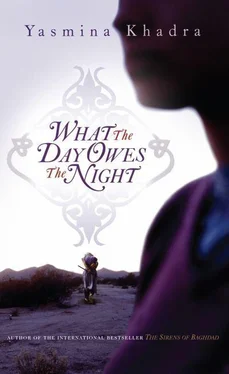There were prophets who came to harangue the crowd. Their gestures solemn, their voices sepulchral, they would stand on their makeshift platforms and hold forth, denouncing the corruption of the spirit, heralding the coming of the Judgement Day. They ranted about the Apocalypse, about the rage of men, the fate reserved for impure women; they foamed at the mouth, railing at innocent passers-by, or launched into esoteric ideas that were seemingly unending. ‘How many slaves have risen up against empires only to die on a cross?’ one of them thundered, shaking his shaggy beard. ‘How many kings have thought they could change history only to end up rotting in a dungeon? How many prophets have sought to expand our minds only to leave us more deluded than before?’ ‘How many times have we told you you’re boring?’ someone in the crowd roared back. ‘Why don’t you put a hood over that ugly mug of yours and show us some belly-dancing and stop this lunatic raving?’
Slimane was among the sideshows. With a barrel organ slung across his chest and his marmoset perched on his shoulder, he strutted around the market cranking the handle while the monkey held out a peaked cap to anyone who came near. Whenever someone tossed a coin in, the monkey would pull faces for them. Away from the main attractions were the livestock enclosures and the donkey sellers, wily horse-traders so persuasive they could pass off a mule as a pureblood stallion. I loved to listen to them sing the praises of their animals; being hoodwinked by them was almost a pleasure, since they treated you with the courtesy and deference reserved for an aga.
Sometimes, into this mayhem, the Karcabo would arrive – a troop of black men bedecked with amulets, who danced like demons, rolling their milk-white eyes. We would hear them coming from the devilish racket of their metal castanets, the roll of their drums. The Karcabo came only for the feast day of the marabout Sidi Blal, their patron. They would come into town leading a sacrificial bull calf draped in the colours of the brotherhood and go from door to door to collect money for the sacrifice. In Jenane Jato, women would rush to the doors to watch – even though it was forbidden – children would pop up out of nowhere like gerbils, eager to join the throng, and as the procession moved on, the noise and the clamour grew.
Of all of the extraordinary sites at the festival, Slimane took the prize. His music was sweet and sad as water flowing, and the marmoset was charmingly mischievous. People said Slimane had been born a Christian to a wealthy, educated French family but fell in love with a Bedouin girl and converted to Islam. He could have lived like a king, they said, since his family had never disowned him, but instead he chose to stay with his adoptive people and share their joys and their pains. We all thought this was touching. No one, Arab or Berber, even the most hard-hearted, had anything but respect for him, and no one would raise a hand against him. I was very fond of Slimane. As far back as I can remember, deep in my heart – the heart of the old man I am now – no one that I ever met better embodied what I believe to be the greatest of virtues: discernment, a quality that is all but lost today, but one which did much for the reputation of my people at a time when few had any respect for us.
Meanwhile, I had befriended Ouari, a boy a few years older than me, who was thin, almost emaciated, with reddish-blonde hair, bushy eyebrows and a hook nose like a sickle. He was not really a friend, but he didn’t seem to mind me hanging around, and since I needed him, I did everything I could to win his friendship. Ouari was probably an orphan – or a runaway; I never once saw him go in or come out of a house. He spent his time behind a vast pile of scrap metal in something that looked like a henhouse carpeted with dung, and spent his time hunting goldfinches so he could sell them at market.
Ouari never spoke. I would talk to him for hours; he paid me no mind. He was a mysterious, solitary boy, the only one in the neighbourhood who wore trousers and a beret. All the other boys wore long gandurahs and a fez. In the evenings he made traps with olive branches dipped in birdlime. In the mornings I would follow him into the scrubland and help him set the traps. When a bird landed on one of the traps and began to flap its wings frantically, we’d rush over and put it in a cage while we waited to catch some more. In the afternoon we would stroll through the streets offering our hunting trophies to novice bird-catchers.
The first few pennies I ever earned, I made with Ouari. Ouari never cheated me. At the end of our first hunting expedition – which lasted several days – he asked me to follow him to a quiet corner, where he spilled the contents of the game bag he used as a purse. He divided up the coins, one penny for him, one for me, and so on until there were none left. He walked me home, then he vanished. The next morning I went looking for him at the chicken coop. I don’t think he would ever have come looking for me. He seemed perfectly capable of getting by without my help or anyone else’s.
I felt good being around Ouari, confident and relaxed. Even the little savage Daho left us in peace. Ouari had a dark, steely, mysterious look about him that kept people at bay. He didn’t say much, but he had only to scowl and the street kids disappeared so fast it took their shadows a moment to catch up. I think I was happy around Ouari. I got a taste for hunting goldfinches and learned a lot about traps and camouflage.
Then, one evening, hoping to make my father proud of me, it all collapsed. I waited until after supper before taking my purse from its hiding place. Hands trembling with excitement, I held out the fruits of my labours.
‘What’s this?’ my father asked suspiciously.
‘I don’t know how much is there, I don’t know how to count . . . but it’s the money I made selling birds.’
‘What birds?’
‘Goldfinches. You catch them with twigs dipped in birdlime—’
My father grabbed my hand. His eyes were like white-hot ball bearings, and his voice shook as he said:
‘Listen carefully, son, I don’t need your money, and I don’t need an imam nipping at my heels.’
As my face distorted with pain, his grip tightened.
‘I know I’m hurting you, son, I can feel your pain like it was my own. I’m not trying to break your hand, I’m trying to get it into that thick skull of yours that I’m not a ghost. I’m flesh and blood and I’m very much alive.’
I felt my fingers crushed by his fist, hot tears blurred my vision. I was choking with the pain, but there could be no question of whingeing or crying. Everything was a matter of honour between my father and me; and honour was measured by our ability to endure pain.
‘What can you see right there in front of you?’ He nodded to the low table, the leftover food.
‘Supper, Papa.’
‘I’m not saying it’s a feast, but you get enough to eat, don’t you?’
‘Yes, Papa.’
‘Have you ever gone to bed hungry since we came to the city?’
‘No, Papa.’
‘And that table there, the one you’re eating off, did we have it when we got here?’
‘No, Papa.’
‘What about the paraffin stove? Did someone give it to us? Did we find it in the street?’
‘You bought it, Papa.’
‘When we got here, the only light we had was a marepoza – a miserable bit of wick floating in a puddle of oil, remember? What have we got now?’
‘An oil lamp.’
‘What about the sleeping mats, the blankets, the pillows, the buckets, the broom?’
‘You bought them, Papa.’
‘Then why can’t you get it into your head, son? I told you the other day, I might have lost my lands, but I haven’t lost my soul. I couldn’t save the damned farm, and I’m sorry. You can’t imagine how sorry I am. There’s not a minute of the day I don’t think about it. But I’m not about to give up. I work every hour God sends, I break my back to get us back on our feet. And it’s up to me – and only me – to make that happen. Do you understand, son? I don’t want you feeling guilty about what happened. It’s not your fault. You don’t have to give me money. I wouldn’t send you out to work to make ends meet, I wouldn’t stoop to that. If I fall, I pick myself up again; that’s the price I have to pay and I don’t blame anyone. And I will do it, I swear to you. Like I told you, I have the power to move mountains. So in the name of our dead and those of us still living, if you want to make my life easier, just promise me you’ll never again do what you’ve just done to me, because every penny you bring into this house just makes my shame worse.’
Читать дальше












